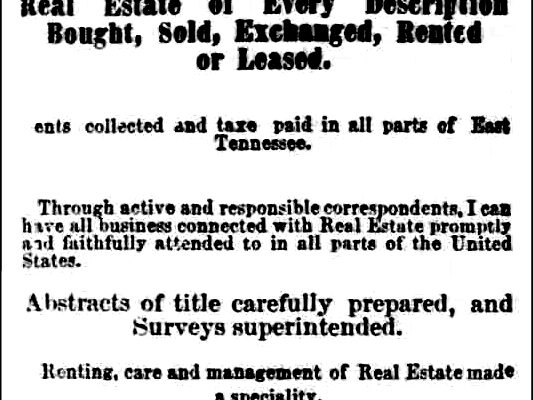In 1872, two gentlemen, who had relocated to Johnson City from New York several years prior, were asked to express their thoughts about living in our mountainous community as contrasted to their former residences.
The men were John Caulkins and “Yankee” Smith. Collectively, they provided an interesting glimpse of what East Tennessee was like 28 years before the turn of the 20th century, at least in the opinion of two displaced Northerners. Note that this was just seven years after the Civil War ended.
Mr. Caulkins
John's letter noted several advantages, the first being the mildness and health-giving properties of the Southern climate. He boasted that he was writing his letter on April 21 in a short sleeve shirt at 9:00 a.m. in a room with no fire burning, doors wide open and the temperature at 68 degrees F.
John cited specific instances of Northern residents who went to the South on recommendations from their physicians as a cure for pulmonary diseases.
The relocated “Yank” alleged another benefit was having 10 or 11 months out of a year to perform farm work, further noting that the past winter was unusually severe. But even so, at no time was frost more than three inches deep or ice accumulations over six inches, something uncharacteristic of the frigid North.
The South had its share of low-priced land as compared with the North. The writer owned at his New York farm six acres of land, which sold at auction for $650 an acre. He bought a farm of 140 acres near Knoxville for less than $1.50 per acre, which compared favorably with his New York residence. His previous six acres, he claimed, were not any better than the average of his present farm that was sowed in winter wheat.
The same could be said for other crops such as corn, oats and potatoes. As to fruit, he previously never saw a better crop or larger production anywhere than he found in East Tennessee. With regard to variety, he grew all the standard fruits, both large and small, to their utmost perfection.
However, the Northerner had a few shortcomings to identify. He said the county where he abode contained many farm buildings that were unsightly and generally in pathetic shape. The roads and highways were rough and, in some cases, appalling. He felt that the area would eventually open up and develop into one of the finest agricultural regions in the world; he was right.
Another question John responded to was how welcome Northern men were to the region. He stated emphatically that all men were treated equally well with one stipulation – “that they behave themselves.” His family learned to love the people of East Tennessee dearly.
Caulkin's letter offered advice to anyone pondering a change of residence: “If your numerous readers desire to change their place of residence, we really think they will find in East Tennessee more substantial advantages and fewer shortcomings than in any section known to the writer.”

Local Advertisement from 1872
“Yankee” Smith
The second letter from “Yankee” Smith offered a somewhat different perspective. Although he had lived in East Tennessee for a period of time, for reason not stated, he was returning to the North.
In his Tennessee home in Roane County, nearly all of the sowing was done by April 1. Although spring was exceptionally late, the planting of corn had commenced and, in some instances, garden work was so far completed such that peas and the like had fully awakened from their winter nap.
Smith believed that the people of East Tennessee were destined to become one of the foremost in the land. Noting that Tennesseans were a liberty-loving people, he believed they could not fail to rise.
The Northerner further commented that he was keenly aware of misrepresentations of life in Tennessee by persons from the North. However, those who came as laboring men, were ready to aid in any and everything that would be advantageous to the settlement where they might locate and be heartily welcomed.
Back in the little village located near their New York destination, the hillsides were still covered with old snow, the precipitation likely laying there for months. He found the Tioughnioga River was still ice-bound, it being frozen over in November to such a thickness that Tennesseans would scarcely believe the report as truth.
Smith concluded his remarks saying, “Can anyone fail to see the great advantages that East Tennessee has over the Northern section? The good features of Tennessee cannot be too highly spoken of.”
These two mostly positive reports about the South were a bit surprising, considering the fact that the Civil War had just concluded.
